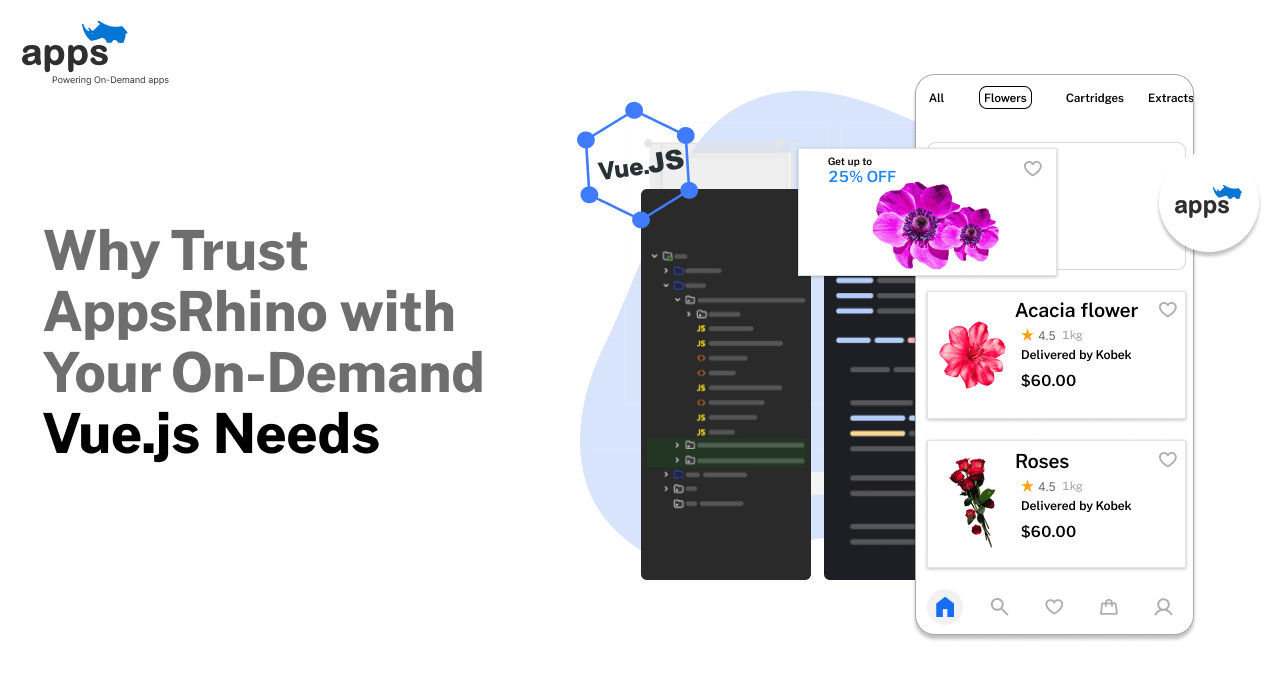- What Do Angular Developers Do?
- How Much Does It Cost to Hire an Angular Developer?
- What Skills Should You Look for When Hiring an Angular Developer?
- Where to Hire Angular Expert Developers
- Step-by-Step Hiring Process for Angular Developers
- How to Hire the Best Angular Developers: Best Practices
- Top Interview Questions for Hiring Angular Developers
- Common Mistakes to Avoid When Hiring Angular Developers
- Conclusion
- Frequently Asked Questions (FAQs)
Table of Contents
How to Hire the Right Angular Developer: Where to Search, What to Ask, and Avoid

Most hiring managers think finding an Angular developer is easy. Post a job, review a few resumes, and you’re done.
Yet, over 60% of web projects end up delayed or over budget because the “right hire” wasn’t really the right fit.
The truth? Hiring an Angular developer isn’t just about technical skill. It’s about finding someone who understands scalability, user experience, and the fast-changing world of modern web frameworks.
This guide breaks down exactly how to hire the right Angular developer, where to look, what to ask, and the red flags to avoid. So your subsequent project launches on time and performs flawlessly.
What Do Angular Developers Do?
We all know hiring the right people is critical, but before we discuss that, let's start at the beginning. Can you explain what Angular is, define the role of an Angular Developer, and describe their key functions?
Let’s begin with it.
Understanding Angular (Web Framework)
Angular is a robust web framework built by Google. It’s designed for creating dynamic, single-page web applications that look and perform like native apps.
Unlike static websites, Angular uses a component-based architecture, allowing developers to reuse code to speed up development and ensure consistency.
Three main technologies power it:
- TypeScript – a superset of JavaScript that adds type safety and clean structure.
- RxJS – a library for handling data streams and real-time updates efficiently.
- Angular CLI – a command-line tool that helps developers build, test, and deploy projects quickly.
Together, these tools let web developers create scalable, interactive apps used by millions, from dashboards and CRMs to eCommerce stores and SaaS platforms.
For a complete understanding of the role, the tech stack, and the career path from A to Z, refer to our detailed resource: Who are Angular Developers: Your A-to-Z Guide.
Core Responsibilities of Angular Developers
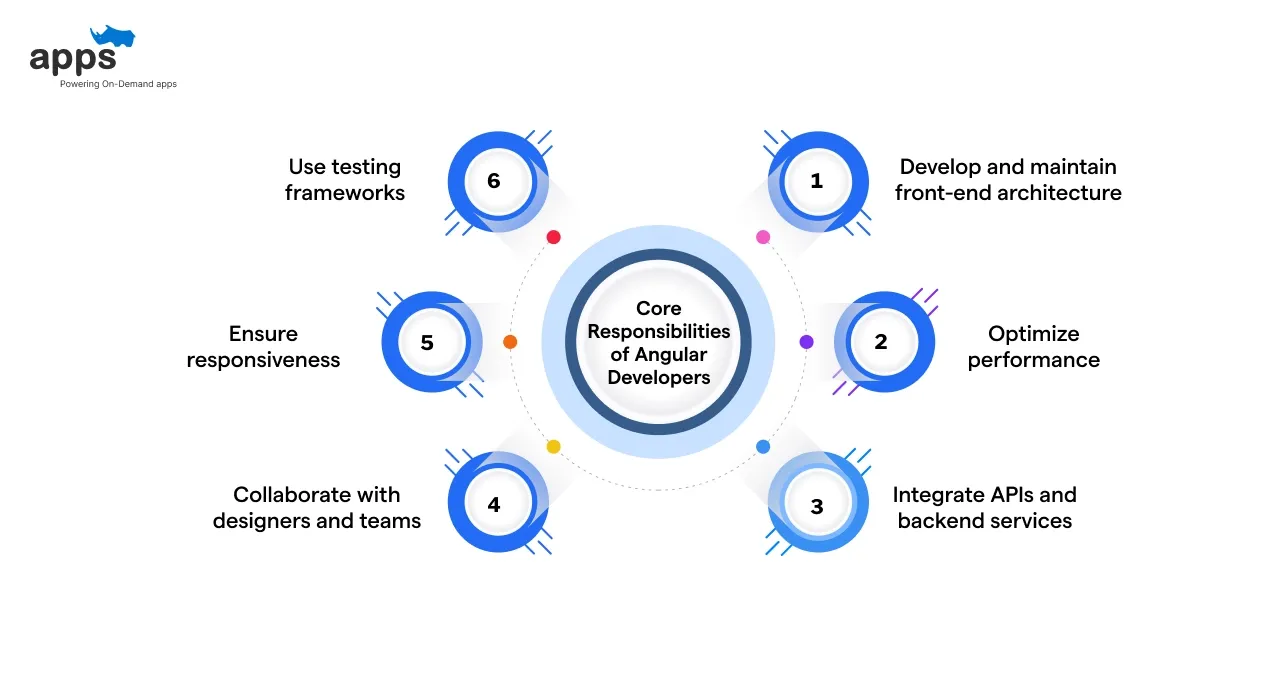
An Angular developer’s role goes far beyond coding. They handle everything that turns an idea into an interactive digital experience.
Here’s what they typically do:
- Develop and maintain front-end architecture: Writing structured, reusable components using Angular and TypeScript.
- Optimize performance: Ensure the app runs smoothly even under complex data and high traffic.
- Integrate APIs and backend services: Connecting front-end elements with real-time data through REST or GraphQL APIs.
- Collaborate with designers and teams: Aligning UI/UX design with technical functionality.
- Ensure responsiveness: Making sure web applications adapt seamlessly to all screen sizes.
- Use testing frameworks: Implementing Jasmine or Karma to guarantee code reliability before deployment.
For instance, when you hire Angular expert programmers for an eCommerce site, they ensure product pages load instantly, filters work in real time, and checkout runs without lag, all while keeping the design consistent.
Why Their Role Matters in Your Business
Whether you plan to hire dedicated Angular developers in-house or collaborate with an offshore Angular company, their work directly shapes how users experience your product.
If you're still weighing the fundamental business case, you should look at the Top 9 Reasons to Consider Hiring an Angular Developer to see the full value proposition.
Angular developers:
- Help businesses deliver faster, scalable applications.
- Improve customer engagement through smooth interactions.
- Ensure maintainability so that future updates become simpler and quicker.
Suppose you’re exploring how to hire Angular developers in the USA or hire Angular developers in India. In that case, knowing these roles and skills helps you align expectations and find developers who match both your goals and tech stack.
In short, Angular developers transform complex business logic into simple, engaging user experiences.
How Much Does It Cost to Hire an Angular Developer?
When planning how to hire Angular developers, cost is one of the most crucial factors.
Understanding these factors helps you budget realistically and avoid unnecessary expenses.
Regional Comparison
Here’s a quick comparison table presented below for a better understanding of cost factors:
| Region/Country | Experience Level | Project Complexity | Average Hourly Cost |
| United States |
| Medium to High – Enterprise-grade apps, advanced integrations, real-time data | $80–$150/hr |
| India |
| Low to Medium – Scalable web apps, dashboards, eCommerce | $20–$40/hr |
| Eastern Europe (Poland, Ukraine |
| Medium to High – Custom web solutions, hybrid mobile apps | $35–$70/hr |
| Latin America (Brazil, Argentina) |
| Medium to High – Full-stack and enterprise projects | $40–$80/hr |
| Southeast Asia (Philippines, Vietnam) |
| Low to Medium – SaaS platforms, eCommerce apps, maintenance | $25–$50/hr |
Factors Influencing Angular Developer Costs
Experience Level
- Junior (0–2 years): Entry-level developers charge less as they usually work under supervision and handle simpler tasks.
- Mid-level (2–5 years): Capable of managing independent modules, optimizing performance, and integrating APIs.
- Senior (5+ years): Skilled in architecture design, code optimization, and leading teams commanding higher rates.
Project Complexity & Duration
- Minor UI updates or bug fixes cost less than complex enterprise applications.
- Projects involving third-party integrations, real-time data handling, or advanced Angular (web framework) features increase costs.
Hiring Model
- In-house: Full-time employees with salary, benefits, and workspace costs are ideal for long-term control.
- Freelance: Hourly or per-project payments; best for short-term, low-complexity tasks.
- Outsourcing/Offshore: Most cost-effective for scalability and continuous delivery.
Location & Time Zone Differences
- Developers in high-cost regions (such as the United States or Western Europe) charge more due to higher living expenses.
- Offshore developers in regions such as India, Eastern Europe, and Southeast Asia offer similar skills at lower rates.
- Time zone overlap can also affect pricing for real-time collaboration.
Technical Skill Set & Framework Version
- Developers experienced in AngularJS, Angular 6+, TypeScript, and RxJS command higher rates.
- Those skilled in testing frameworks, API integration, or full-stack development bring added value.
Engagement Duration & Support Needs
- Short-term projects may cost more per hour due to tight deadlines.
- Long-term contracts often come at discounted hourly rates but require sustained resource allocation.
Understanding these pricing dynamics helps you plan smarter,, whether you’re looking to hire Angular developers in the the USA for top-tier projects or hire Angular JS developers offshore for scalable, cost-efficient solutions.
What Skills Should You Look for When Hiring an Angular Developer?
Once you understand the cost of hiring, the next step in learning how to hire Angular developers is identifying the right skills.
Whether you’re planning to hire Angular JavaScript developers for a startup or a large enterprise, assessing the right mix of hard and soft skills will help you choose the best fit.
Top Hard Skills (The Must-Haves)
Technical skills form the foundation of a strong Angular developer. These are the non-negotiables every candidate must have:
- Proficiency in AngularJS and Angular (web framework): Developers should be fluent in both the older AngularJS and the modern versions (Angular 6+), as many organizations still maintain legacy projects while developing new ones.
- Strong command of TypeScript and JavaScript: Since Angular is built on TypeScript, developers must understand advanced TypeScript features such as decorators, interfaces, and data binding.
- Experience with RxJS: Reactive programming using RxJS is crucial for managing asynchronous operations and handling data streams efficiently.
- UI/UX and responsive design: Developers should know HTML, CSS, and component styling to create interfaces that look good across devices.
- RESTful APIs and Git: Connecting the front end with APIs and maintaining clean version control is essential for collaboration.
- Unit testing tools: Experience with Jasmine and Karma ensures reliable code and smooth deployments.
For example, a skilled Angular developer working on a finance dashboard should be able to use RxJS for live data updates while maintaining performance and visual clarity.
Top Soft Skills (Equally Important)
Technical expertise means little without the right mindset. Great Angular developers for hire stand out through their approach and collaboration skills.
- Problem-solving and adaptability: Every project comes with unique challenges. A developer’s ability to debug, find alternatives, and adapt to new frameworks ensures steady progress.
- Clear communication: Angular developers often collaborate with designers, QA, and backend engineers. Clear and proactive communication prevents costly misunderstandings.
- Teamwork and accountability: Especially in hybrid or remote setups,, such as when you hire Angular developers in India or offshore, accountability keeps projects on track.
- Attention to detail: From writing clean code to testing every component, detail-oriented developers ensure app stability and a better user experience.
Nice-to-Have Skills (The Differentiators)
These aren’t deal-breakers but can make a huge difference in overall efficiency and innovation:
- CI/CD pipelines: Familiarity with tools such as Jenkins or GitHub Actions accelerates deployments and reduces downtime.
- Cloud deployment experience: Understanding AWS, Azure, or Google Cloud enables smoother app hosting and scalability.
- UI/UX awareness: Developers who understand user experience can align design with functionality.
- Accessibility standards: Knowledge of WCAG and inclusive design ensures apps are usable by all audiences.
In short, when evaluating Angular developers for hire, look for a balance of substantial technical depth, effective collaboration, and proactive problem-solving.
These are the skills that turn good web developers into long-term assets for your business.
Where to Hire Angular Expert Developers
Once you’ve defined your hiring process, the next step in how to hire Angular developers is knowing where to find them.
Whether you hire Angular programmers locally or offshore, each option offers unique perks from better collaboration to lower costs and 24/7 development support.
Location Options: Local, Remote US, or Global
- Local Hiring: Hiring locally allows for real-time collaboration and smoother communication.
If your project requires daily stand-ups, on-site brainstorming, or immediate feedback, local developers are often the best fit.
However, local hires, especially in the United States, typically come at higher hourly rates.
- Remote Developers (US-based): If you want experienced professionals familiar with US business culture but without the overhead of in-office work, remote developers are a great middle ground.
Many companies prefer this model to maintain flexibility while ensuring alignment with time zones and communication standards.
- Global and Offshore Developers: For cost efficiency and scalability, many organizations hire AngularJS developers offshore, particularly in India, Eastern Europe, or Southeast Asia.
Offshore teams offer access to skilled developers proficient in Angular (web framework), TypeScript, and RxJS at competitive rates.
To understand the full advantages of this approach, including cost savings, scalability, and access to a massive talent pool, see Why Should You Hire Angular Developers from AppsRhino?.
The key is to ensure strong project management and overlapping work hours for smooth collaboration Cultural compatibility and time-zone planning are essential for maintaining productivity and communication when hiring globally.
Choosing the Right Sourcing Channel
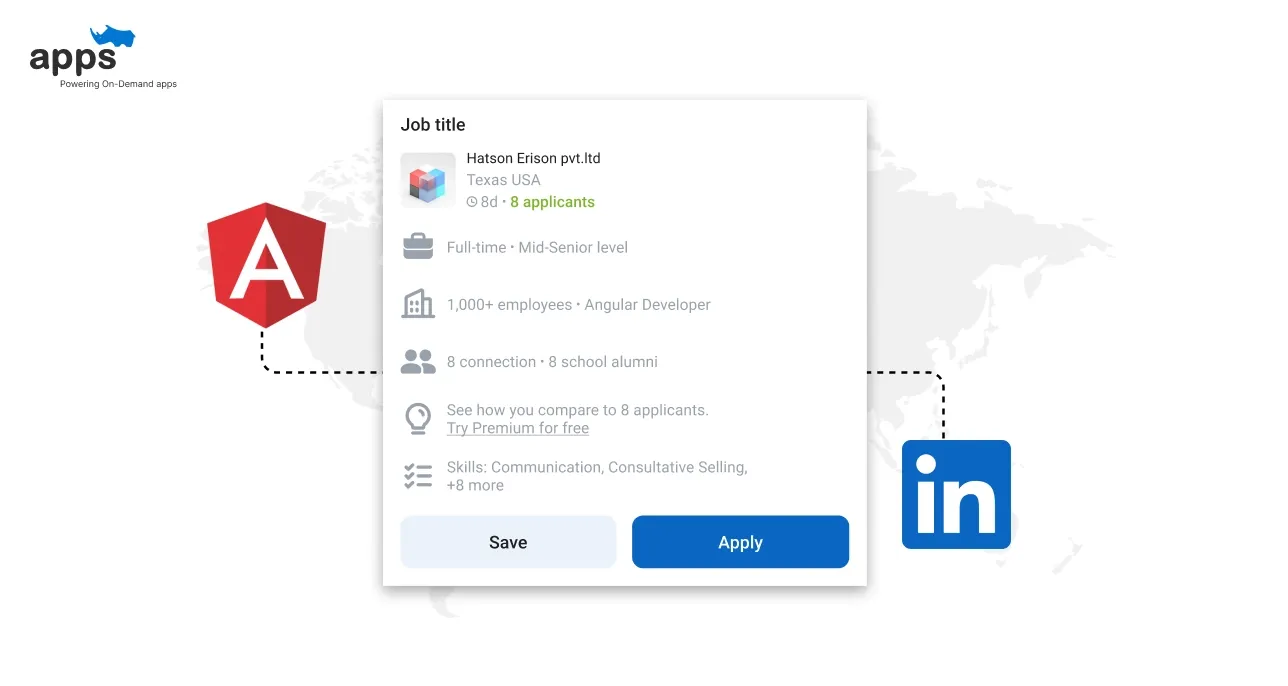
It’s essential to know how to choose the right channel for hiring Angular developers.
Let’s find out what those are.
- Job Boards: Posting on platforms like LinkedIn, Indeed, or Glassdoor is a reliable way to source Angular developers for hire.
It’s best suited for long-term or full-time roles where you want complete control over the hiring process.
- Tech Platforms: Freelance marketplaces such as Upwork, Toptal, and Fiverr connect you with vetted developers worldwide.
These platforms are ideal when you need to hire Angular 5 developers, freelancers, or part-time Angular coders for short-term tasks or prototypes.
- Vendor Partnerships: For businesses that need end-to-end management, partnering with a Hire Angular expert company or an IT vendor can streamline recruitment, onboarding, and project execution.
If you’re ready to bypass the traditional recruitment overhead, you can directly hire Angular Developers from a pre-vetted talent pool.
Vendors often have pre-vetted teams of Angular 4 developers and senior architects ready to deploy.
Choosing the right mix of location and sourcing channel depends on your goals local hires bring control, while global developers deliver scale and affordability.
Step-by-Step Hiring Process for Angular Developers
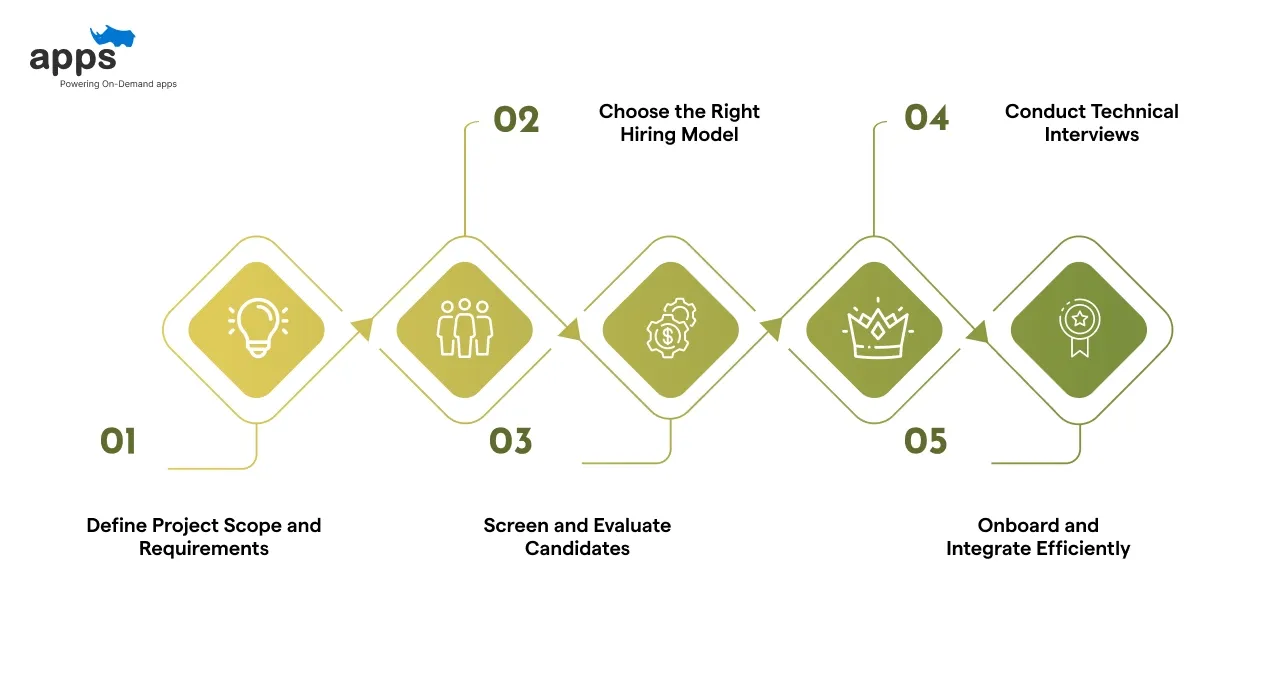
Now that you know which skills to look for, the next step in hiring Angular developers is to build a structured hiring process.
Here’s a step-by-step breakdown that works whether you want to hire Angular programmers in the United States, India, or offshore.
1. Define Project Scope and Requirements
Start by outlining what you want to build and what success looks like.
Define:
- Deliverables: Define core modules, user flows, and performance benchmarks to set clear expectations.
- Timeline: Establish project milestones and target launch dates for better tracking.
- Tech Stack: List required frameworks, tools, and APIs to align development with technical needs.
A clear roadmap makes it easier to assess if a candidate’s Angular (web framework) experience matches your needs.
2. Choose the Right Hiring Model
How you hire affects both cost and project control.
- In-house: Best for continuous projects needing full-time collaboration.
- Freelance: Ideal for quick bug fixes or short-term tasks.
- Outsourcing/Offshore: Perfect for scaling efficiently at lower costs — for instance, when you hire AngularJS developers offshore or from India.
If you’re unsure, start with a hybrid model: a core in-house team supported by offshore specialists.
3. Screen and Evaluate Candidates
Look beyond resumes.
- Go beyond resumes: Focus on real project experience, not just listed skills.
- Review portfolios and GitHub: Evaluate past Angular projects for code quality and structure.
- Assess technical depth: Test proficiency in TypeScript, RxJS, and responsive UI development.
- Conduct practical evaluations: Use coding challenges or short assignments to assess problem-solving and logical reasoning.
A strong Angular coder should not only write efficient code but also explain their logic clearly.
4. Conduct Technical Interviews
Once you’ve shortlisted candidates, use focused questions to test technical and architectural understanding.
Ask about:
- Discuss core concepts: Ask about component lifecycle hooks and how they manage data binding in Angular.
- Test real-time handling: Evaluate their approach to managing asynchronous updates using RxJS.
- Assess problem-solving depth: Explore how they debug complex issues and optimize performance for scalability.
This step reveals how well they can handle real-world challenges when you're finding out How To Hire Angular 6 Developers or newer frameworks.
5. Onboard and Integrate Efficiently
Structured onboarding helps new Angular developers adapt more quickly and contribute effectively from day one.
- Share project context: Define goals, timelines, and key features.
- Set coding standards: Establish best practices for your Angular (web framework) setup.
- Provide tool access: Give logins for Jira, Slack, GitHub, etc.
- Sync regularly: Schedule quick stand-ups, especially with offshore teams.
- Assign a mentor: Speed up adaptation and reduce friction.
Efficient onboarding sets the tone for collaboration and long-term success.
A defined hiring process turns hiring Angular developers from guesswork into a strategy, ensuring you bring in skilled professionals who can deliver value from day one.
How to Hire the Best Angular Developers: Best Practices
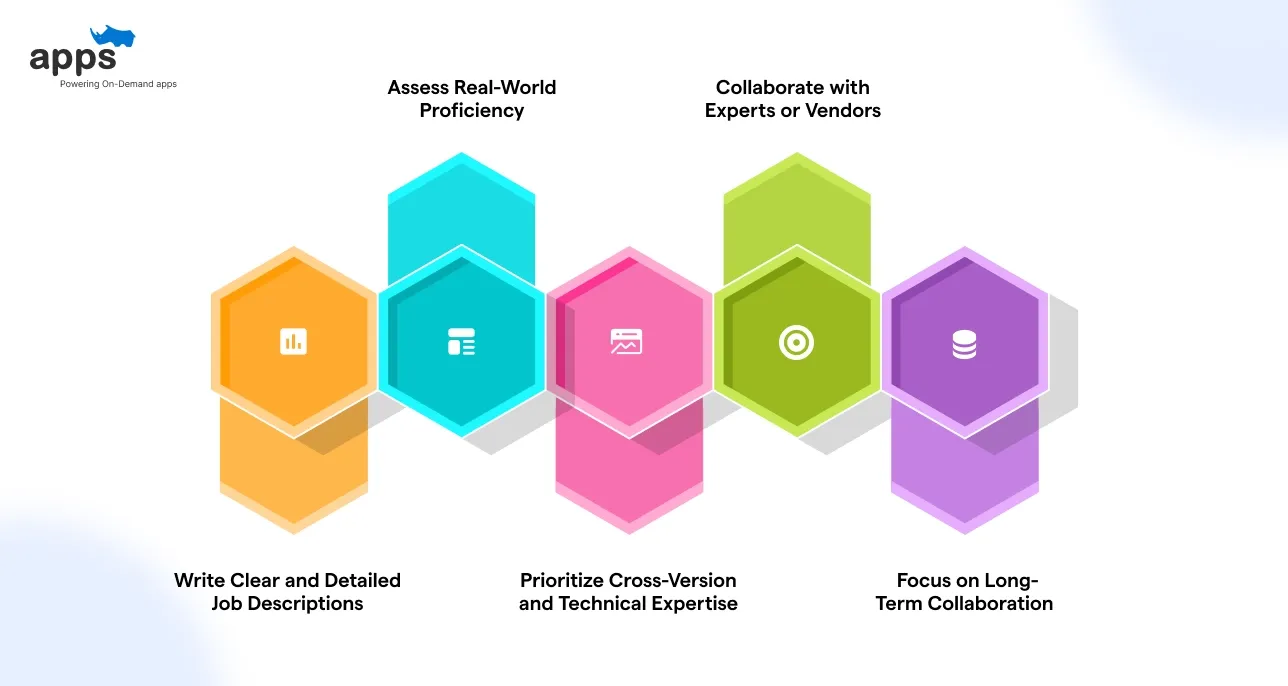
With so many Angular developers for hire, the challenge isn’t availability; it’s identifying the best fit for your project’s goals, tech stack, and timeline.
Following these best practices will help you hire smarter, faster, and more effectively, whether you plan to hire Angular expert programmers in the United States or build an offshore team.
1. Write Clear and Detailed Job Descriptions
A strong job post attracts the right developers and filters out mismatched candidates.
Mention:
- Required frameworks and versions (Angular 6+, AngularJS, TypeScript, RxJS).
- Expected responsibilities such as front-end architecture, integration, or UI performance.
- Tools and environment (Git, Jira, REST APIs).
Example: If you need to know How To hire Angular 6 developers, specify this version to avoid candidates skilled only in AngularJS.
2. Assess Real-World Proficiency
Go beyond theoretical questions, ask coding challenges or short tasks that mimic real-world issues.
Practical tests reveal how a developer structures components, handles asynchronous data, or applies design principles.
You can also evaluate past project repositories or case studies to check for performance optimization and modular coding practices.
3. Prioritize Cross-Version and Technical Expertise
Look for developers who are comfortable with both AngularJS and modern Angular (web framework).
Proficiency in TypeScript, RxJS, and unit-testing tools such as Jasmine and Karma ensures scalability and reliability in production.
4. Collaborate with Experts or Vendors
Partnering with a Hire Angular expert company or recruitment specialist accelerates hiring and ensures vetted talent.
These experts often maintain a network of pre-qualified Angular JavaScript developers, reducing time-to-hire and onboarding challenges.
5. Focus on Long-Term Collaboration
The best Angular projects evolve. Prioritize developers open to long-term engagement for smoother maintenance and updates.
When you hire dedicated Angular developers or offshore teams, ensure clear contracts, communication standards, and performance metrics.
By following these proven best practices, you’ll not only find skilled developers, but you’ll also build a reliable, future-ready team that can adapt, scale, and deliver consistent results.
Top Interview Questions for Hiring Angular Developers
Interviews are where great hires stand out. It exposes how a developer thinks, communicates, and solves real challenges.
Below are some practical interview questions that help identify capable Angular programmers while filtering out those who lack real-world experience.
Sample Interview Questions
1. Can you walk me through a challenging Angular feature you built recently?
This question helps you understand how candidates approach complex problems and apply TypeScript or RxJS in real projects.
Watch out for: Vague or theoretical answers, which suggest the developer hasn’t handled real production issues.
2. How do you structure your Angular components for scalability?
This reveals their understanding of maintainable architecture, modular components, and best practices like lazy loading.
Watch out for: Answers that focus only on UI or visuals; they might lack backend or architectural depth.
3. What do you do when design specs don’t align with feasibility?
Tests communication and adaptability. Great developers explain how they collaborate with designers or product owners to find workable solutions.
Watch out for: Defensive or rigid responses, these often indicate poor teamwork or problem ownership.
4. How do you approach testing your Angular applications?
Shows whether the candidate values quality assurance and is familiar with tools like Jasmine or Karma.
Watch out for: Candidates who skip testing entirely or rely solely on manual QA, that’s a red flag for long-term reliability.
5. Can you explain a technical concept to a non-technical stakeholder?
Evaluates their ability to communicate clearly across teams, a must-have skill for remote or cross-functional work.
Watch out for: Overly technical jargon signals poor communication and a lack of empathy for non-developers.
6. How have you managed state in a large Angular application, and what tools did you use?
This question digs into how the candidate handles complexity state management is crucial in scalable Angular apps (e.g., using NgRx, services, or other patterns).
Watch out for: Answers that only mention local component state or explain state in very generic terms good candidates will talk about global vs local state, performance implications, avoiding memory leaks, and real-world tool usage.
7. Can you describe how you optimise performance in your Angular apps (e.g., bundle size, change detection, lazy loading)?
This evaluates whether the developer goes beyond “it works” and actually cares about speed, load time, and user experience.
Watch out for: If the answer is limited to “I code cleanly” or “I use Angular CLI defaults” without discussing techniques like OnPush change detection, trackBy with *ngFor, module lazy loading, or tree-shaking.
8. Tell me about a time when you had to integrate Angular with a backend system or third-party API and faced a challenge. How did you handle it?”
This shows their ability to work in real project conditions handling API errors, latency, authentication, data mapping, or real-time updates.
Watch out for: If the candidate’s answer remains vague or theoretical; strong candidates will give specific examples of issues, how they debugged, how they adapted the front-end code or architecture to work with backend constraints.
Asking these questions gives you a clear sense not just of who can code, but also ofwho can collaborate, communicate, and deliver.
That’s what defines a great hire when it comes to mastering how to hire Angular developers for any project.
Common Mistakes to Avoid When Hiring Angular Developers
Mistakes in the hiring process ripple outward, affecting team morale, performance, and the bottom line.
1. Hiring Based Solely on Cost
Choosing the cheapest option may backfire. Reports from Full Scale estimates that the actual cost of developer hiring can be 40–70% higher than just salary due to hidden expenses like mistakes, revisions, and delayed delivery.
Watch out for: Candidates with low rates but minimal track records or inconsistent results.
2. Ignoring TypeScript and Version Compatibility
When you hire Angular 6 developers, they must know TypeScript and are up-to-date with the Angular (web framework) version running your app.
A study by Ambacia found that many teams still default to AngularJS, resulting in high refactoring costs and slower development cycles.
Watch out for Developers who highlight only older versions, like AngularJS, without mentioning modern stacks.
3. Overlooking Soft Skills and Communication
Technical proficiency alone isn’t enough. A study from Cornell University found that 650 software job ads placed strong emphasis on soft skills like communication, teamwork, and adaptability.
Watch out for: Candidates who struggle to explain complex ideas clearly, they may struggle in a team-oriented environment.
4. Failing to Test for Scalability and Maintainability
Poor code quality slows development and costs real money.
Another research form Cornell University shows that bad software practices lead to up to 42% of developers’ time wasted resolving defects rather than delivering features.
Watch out for: candidates who can’t explain modular architecture or component reusability within Angular.
5. Not Verifying Real Project Experience with Angular 6 or Later
The difference between seeing “Angular” on a resume and properly evaluating version-specific experience matters.
A recruitment article from Dev noted one significant mistake is “not checking past project results,” leading to misplaced hires.
Watch out for: Candidates who cannot point to production apps built with modern Angular (web framework) versions, TypeScript, or RxJS implementations.
Avoiding these common missteps gives you a better chance of hiring developers who deliver value from day one and align with your long-term goals, rather than incurring hidden costs.
Conclusion
Every great digital product starts with one decision: hiring the right developers.
Knowing how to hire Angular developers means understanding the balance between cost, skill, and scalability.
From selecting the right Angular (web framework) version to ensuring your team masters TypeScript and RxJS, each choice shapes your project’s success.
Smart hiring drives faster launches, cleaner code, and better user experiences. Whether you’re expanding your in-house team or exploring offshore partnerships, the right developers turn your vision into measurable growth.
With AppsRhino, you don’t just hire Angular coders; you build a team engineered for success.
Why Hire Developers with AppsRhino
AppsRhino transforms the hiring process into a results-driven partnership, matching you with top Angular talent built for performance and reliability.
Here’s why leading businesses choose AppsRhino to hire Angular programmers:
- Top Vetted Talent: Developers rigorously tested for AngularJS, TypeScript, and RxJS expertise.
- 70% Faster Hiring: Get matched with qualified web developers in under 48 hours.
- 60% Cost Efficiency: Save significantly by hiring Angular developers in India or offshore teams without compromising quality.
- Project-Ready Onboarding: Instant access to secure, tool-integrated workspaces for immediate development.
- Guaranteed Fit: 7-day free trial with complete flexibility to replace or extend your team anytime.
- Dedicated Account Managers: One point of contact ensuring clarity, progress, and communication.
- Zero Recruitment Overhead: No hiring admin, payroll, or compliance headaches; we handle it all.
- Scalable on Demand: Expand or downsize your developer team instantly based on project needs.
- Proven Track Record: 200+ projects delivered for global brands across 35+ industries.
- Language & Time-Zone Compatibility: Developers aligned with your preferred time zones and fluent in English for seamless collaboration.
- Rapid Start: Hire a dedicated Angular developer and kickstart your project within just 3 days.
- Flexible Engagement Models: Choose from full-time, part-time, or hourly options to suit your project scope and budget..
AppsRhino helps you hire dedicated Angular developers who are reliable, efficient, and aligned with your business goals so you can innovate faster and scale smarter.
Frequently Asked Questions (FAQs)
How to hire a dedicated Angular developer?
Define your project scope, required skills, and budget. Then, partner with vetted platforms like AppsRhino to find experienced Angular developers suited for long-term collaboration.
How much does an Angular developer charge per hour?
Rates vary by region and experience. In the United States, it ranges from $80–$150/hour, while in India or offshore teams, it ranges from $20–$50/hour.
How much does it cost to hire a developer?
The cost depends on experience, location, and project size. On average, hiring a mid-level Angular programmer costs $3,000–$10,000 per month globally.
What is an Angular developer’s salary?
Angular developers in the US earn around $110,000/year, while in India, the average salary ranges between ₹10–20 LPA, depending on experience and project complexity.
Is there demand for Angular developers?
Yes, demand for Angular (web framework) experts continues to grow due to its scalability, performance, and enterprise adoption for dynamic web applications worldwide.
What’s the difference between hiring locally and offshore for Angular projects?
Local hiring offers better communication and cultural alignment, while offshore developers provide significant cost savings, flexible hours, and 24/7 development cycles for faster delivery.
Table of Contents
- What Do Angular Developers Do?
- How Much Does It Cost to Hire an Angular Developer?
- What Skills Should You Look for When Hiring an Angular Developer?
- Where to Hire Angular Expert Developers
- Step-by-Step Hiring Process for Angular Developers
- How to Hire the Best Angular Developers: Best Practices
- Top Interview Questions for Hiring Angular Developers
- Common Mistakes to Avoid When Hiring Angular Developers
- Conclusion
- Frequently Asked Questions (FAQs)



